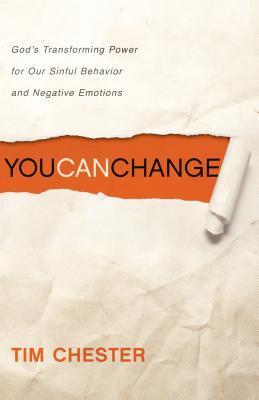What do you think?
Rate this book


192 pages, Paperback
First published June 20, 2008
This book is about hope. It's about the hope we have in Jesus … hope for change. … This book points to Jesus and explains how faith in Jesus leads to change, what theologians call sanctification or becoming more like Jesus.The book is structured as a "change project"; you choose an area you need to change (a sin you need to overcome), and each chapter ends with questions for reflection, as well as thought-provoking questions to help you progress through your change project.
We don't need anything new to be godly because we already have all we need. The great and precious promises that shape our new identity enable us to be like God. Growth in godliness begins with faith in those promises. [See 2 Pet 1:3-9.]How Are You Going to Change?
Not all anger is bad. God himself is angry about sin. Good anger is an emotional response to the right things (sin and injustice) in the right way (controlled and desiring good). But think about the last time you were angry in a destructive way … James says that what causes fights and quarrels are the desires that battle within (James 4:1-2). Anger arises because our desires are thwarted or threatened. … We can't blame our circumstances. [Jas 1:13-15]Don't think of sin as being overwhelmed by external factors; think of it as disobedience.
Without grace, we view life as a contract between us and God: we do good works, and in return he blesses us. When things go well, we're filled with pride. But when things to badly, either we blame ourselves (and feel guilty) or we blame God (and feel bitter). … But in actuality the contract or covenant between us and God already reads 'Paid in full by the blood of Jesus.'Every day, choose the real world in which God is sovereign over the fantasy in which you're sovereign.
The life of obedience is not the bad or sad life. It's the good life. Life with God is the best life you could live. Change is about enjoying the freedom from sin and the delight in God that God gives to us through Jesus."Joyless duty will characterize our attitude if we think of God as an uncaring boss. But when we see him as a gracious Father, our attitude will be one of joyful service."
God isn't the key to the good life (however I choose to define it). He defines the good life. He is the good life. God must be desired for his own sake, not as the purveyor of worldly success.If you're bitter about something missing from your life, you're wanting it more than God.
It's so much better to be a minor character in God's story than to try to write our own script. Living with God at the center is the good and sane life.
I'm grumpy because things aren't going my way. But I've no right and no need to expect them to go my way. It's enough to know that they're going God's way and that his ways are good.Having a God-centered perspective humbling (it puts you in your place) and liberating (you don't need to try to be in control). When we recognize this is God's world, we stop trying to be in control.
A desire is sinful when it produces bad fruit in your life (disobedience, anger, anxiety, and so on). When you see that bad fruit, trace it back to the idolatrous desires of your heart.
Along with weeding out sin, we need to plant in grace. … When our thoughts are filled with the glory of God and our lives are filled with the service of God, there'll be less room for sin and temptation (Galatians 6:7-10).Any particular sin isn't inevitable for the Christian; we're free from sin's power. Believer that God is bigger than your sinful desires.
If you're frustrated at your inability to change, then your first step is to give up—to give up on yourself. Repent of your self-reliance and self-confidence. Your second step is to rejoice in God's grace—his grace to forgive and his grace to transform.Don't blame circumstances (context, upbringing, personal history, biology, people, personality, etc.) for sin. You choose how you respond. Sin isn't inevitable or appropriate (Jas 1:13-14; 1 Cor 10:13). Blaming circumstances is actually blaming God.
The secret of humility, and therefore of change, is never to stray too far from the cross. It should be often in our thoughts, on our lips, in our songs, determining our actions, shaping our attitudes, captivating our affections.Contemplate that you're a sinner and only the death of the Son of God can save you.
We can't simply tell ourselves to stop sinning. We need to direct the desires that sin falsely satisfies toward that which truly satisfies and liberates—God himself. A renewed affection for God is the only thing that will expel sinful desires. [See Thomas Chalmers' sermon "The Expulsive Power of a New Affection."]
Tell someone to stop sinning and at best they may do so reluctantly and partially. But give them a vision of knowing God and his glory, and they'll gladly root out all that gets in the way of their relationship with God (Hebrews 12:1-3)."We should read the Bible not primarily so that we might expound it, but that it might expound us."